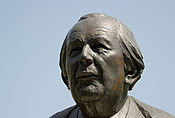Piaget, claimed that young children are egocentric. This does not mean that they are selfish, but that they do not have the mental ability to understand that other people may have different opinions and beliefs from themselves. With his colleague Barbel Inhelder, Piaget did a test to investigate egocentrism called the three mountains problem (Piaget & Inhelder 1948/1956). He put children in front of a simple plaster mountain range and then asked them to pick from four pictures the view that he, Piaget, would see. Younger children before age 7, during the so-called pre-operational stage, picked the picture of the view they themselves saw and were therefore found to lack the ability to appreciate a viewpoint different from their own. In other words, their way of reasoning was egocentric. Only when entering the so-called concrete-operational stage at age 7-12, children became capable of decentring and could appreciate viewpoints other than their own. In other words, they were capable of cognitive perspective-taking.
However, the mountains test has been criticized for judging only the child's visuo-spatial awareness, rather than egocentrism. A follow up study involving police dolls showed that even young children were able to correctly say what the interviewer would see. It is thought that Piaget overestimated the levels of egocentrism in children.
Egocentrism is thus the child's inability to see other peoples' viewpoints. The child at this stage of cognitive development assumes that their view of the world is the same as other people's, e.g. a little girl covers her eyes and says 'daddy you can't see me now, can you?'
Now, there will always be theories that psychologies try to come out with to explain what happen to children during the developmental years. As a parent, I won't be rely too much on those theories as we have different upbringing, environment and definitely different cultures!. Plus every child is unique and if we try to compare our own children is an act of injustice per say.
What can we do in order to somehow reduce (should I use this word?) the egocentrism? I'm going to share my own opinion and my experiences in dealing with young children. (not really an extensive experinces but please bare with me. :D ).
- Ask your children to share and show them how good it is to share with somebody else.
- Be a good role model to your children as they always copy your behaviours (even when you don't really notice it).
- Tell your children that you don't like it when they say "That's mine!".
- Train your children in sharing and appreciating other children. It's better if they have older or younger sibling/siblings.
- Encourage them to use more positive phrases like "I like this toy/ thing too", "It's good to share" and "I love to play with others". (if they are still not be able to talk in full sentences, just use few significant words).
- Always find some quality time with your children as sometimes children become naughty or demonstrate unwanted behaviours because they need your attention.
- Sometimes the old way of saying "No, you can't say that", to your children might just work. (I know that some parents nowadays won't say no just because they want to use positive reinforcement. HUH!)
- You know your children better than other people. You just need to find the best way of dealing with your children by trials and errors.
| Western Philosophy 20th-century philosophy | |
 | |
| Full name | Sir Jean William Fritz Piaget |
|---|---|
| Born | 9 August 1896 |
| Died | 16 September 1980 (aged 84) |
| School/tradition | Developmental |
| Main interests | Natural Sciences |
| Notable ideas | Constructivist epistemology, Theory of cognitive development |

1 comment:
Kak Nur
I love children, nanti nak cubalah teori kak nur kat anak2 buah kita yang besar..kadang2 pening gak melayan..tapi syok sangat2
Post a Comment